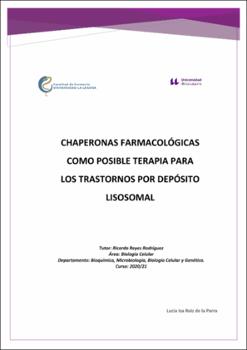Chaperonas farmacológicas como posible terapia para los trastornos por depósito lisosomal
Fecha
2021Resumen
Las enfermedades por deposito lisosomal (LSD), se caracterizan por el acúmulo
patológico de sustratos en la célula, y agrupa a un conjunto de enfermedades monogénicas
causadas por mutaciones en genes que codifican proteínas lisosomales y que afectan en
ocasiones al plegamiento y la conformación de las mismas. Clínicamente heterogéneas
tanto en su debut como en su desarrollo, existen formas infantiles y adultas con afectación
de numerosos sistemas y aparatos. Su difícil diagnóstico y el manejo clínico basado en
tratamientos sintomáticos como la terapia de reemplazo enzimático o la de reducción de
sustrato, están dirigidos a reducir o eliminar los depósitos patológicos para controlar la
sintomatología. El objetivo de este trabajo ha sido la revisión del estado actual de las
terapias disponible para el tratamiento de las LSD, haciendo especial hincapié en el
tratamiento basado en las chaperonas farmacológicas, moléculas que estabilizan la
conformación de las proteínas mutantes, recuperando total o parcialmente su
funcionalidad. Las chaperonas farmacológicas han abierto una nueva vía para el manejo
terapéutico de determinadas LSD que no responden adecuadamente a otros tratamientos. Lysosomal deposition diseases (LSD) are characterized by the pathological accumulation
of substrates in the cell, and comprise a set of monogenic diseases caused by mutations
in genes that encode lysosomal proteins and that sometimes affect the folding and
conformation of cells. themselves. Clinically diverse both in debut and development,
there are child and adulthood forms with involvement of different organic systems and
apparatus. Its precise diagnosis is difficult and clinical management based on
symptomatic treatments, such as enzyme replacement therapy or substrate reduction
therapy, are aimed at reducing or eliminating pathological deposits trying to control
symptoms. The objective of this work has been review the current state of the therapies
available for the treatment of LSD, with special emphasis on treatment based on
pharmacological chaperones, molecules that stabilize the conformation of mutant
proteins, fully or partially recovering their functionality. Pharmacological chaperones
have opened a new therapeutic option for the management of several LSD that do not
respond adequately to other treatments.





